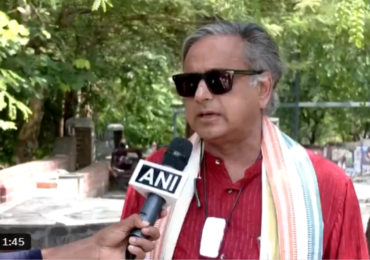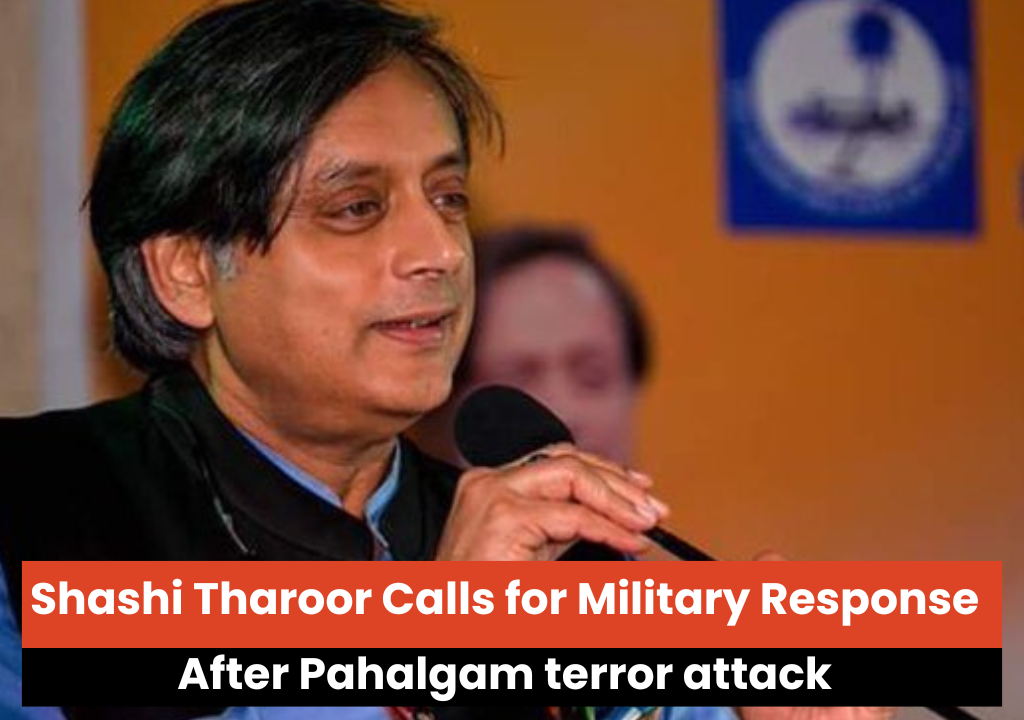As India grapples with the aftermath of the devastating Pahalgam terror attack, prominent Congress leader and former diplomat Shashi Tharoor has called for a visible military response against Pakistan.
Speaking to ANI, Tharoor criticized Pakistan’s long-standing pattern of training terrorists and denying responsibility, emphasizing that the Indian nation now demands swift and strong action.
The Shashi Tharoor Pahalgam Terror Attack statement reflects the growing political and public consensus that diplomatic and economic steps alone may not suffice this time.
Shashi Tharoor Demands Strong Response to Pahalgam Terror Attack
Addressing the escalating tensions between India and Pakistan, Shashi Tharoor told the news agency ANI:
“Some sort of visible military response is unavoidable.”
Tharoor emphasized that the nation’s mood demanded a strong and decisive action in the wake of the Pahalgam terror attack, which claimed the lives of 26 civilians.
He pointed out that Pakistan’s long history of training, arming, and guiding terrorists across the border — while denying involvement — was well-documented and often confirmed by international intelligence agencies.
Reinforcing his stance, Tharoor said:
“There is a clear pattern: people are encouraged, trained, armed, and guided from across the border, and then Pakistan disowns any responsibility.”
In light of these realities, Tharoor suggested that India’s options include diplomatic, economic, intelligence-based, covert, and overt actions, but underlined that a visible military response was now both inevitable and expected.

Comparisons to Uri and Pulwama: Expect Stronger Action
Recalling past instances of India’s military response:
- After the 2016 Uri attack, India launched surgical strikes across the Line of Control (LoC).
- After the 2019 Pulwama attack, India conducted the Balakot airstrikes deep inside Pakistani territory.
Tharoor suggested:
“Today, I think we are going to see more than that.”
This hints at the possibility of a broader and more impactful response than seen in previous incidents, possibly combining military, economic, and covert dimensions.
He stressed that India possesses a range of strategic options — from diplomacy and intelligence operations to covert and overt military actions — but a visible and undeniable reaction would likely be pursued.
Nation’s Sentiment: Public Demands Visible Military Action
Tharoor acknowledged the surging public anger across India:
“The nation is demanding it and expecting it.”
According to Tharoor, public sentiment has reached a tipping point, making it politically and morally necessary for the Indian government to act visibly.
The Indian populace, still grieving and enraged by the deaths of 26 civilians, now demands:
- Justice for the victims,
- Deterrence for future attacks,
- Accountability for terror sponsors.
As seen after Uri and Pulwama, national unity and support for government action is strong and unwavering.
Links Suggested: US Intelligence Chief Backs PM Modi’s Fight Against Pahalgam Terror Attack
Responding to Bilawal Bhutto’s “Blood Will Flow” Comment
Responding sharply to Pakistan People’s Party chief Bilawal Bhutto-Zardari’s inflammatory remarks that “blood will flow” after India’s suspension of the Indus Waters Treaty, Tharoor said:
“This is just inflammatory rhetoric. Pakistanis must understand they simply cannot kill Indians with impunity.”
He made it clear that India does not wish harm upon Pakistanis, but any attack on Indians would be met with swift and severe consequences.
“If blood is going to flow, it will flow possibly more on their side than ours,” he warned.
Tharoor’s comments reflect the broad national consensus that India must not only defend itself but also deter future aggression through decisive action.
Tensions Escalate Between India and Pakistan
Since the Pahalgam attack:
- India has suspended the Indus Waters Treaty.
- India has cancelled all visa services for Pakistani nationals.
- Pakistan, in turn, has suspended all bilateral pacts, including the Simla Agreement.
- Diplomatic missions are being scaled down, with High Commissions reducing their staff to 30 members each by May 1.
Ceasefire violations along the LoC have also surged, raising fears of further escalation.
The atmosphere remains tense, and both nations are preparing for all scenarios, diplomatically, economically, and militarily.
Conclusion
Shashi Tharoor’s call for a visible military response after the Pahalgam terror attack resonates across India.
The country stands united in grief but also in resolve: terror will not go unanswered.
By invoking the lessons of Uri and Pulwama, Tharoor has underlined the need for a decisive, impactful response that deters future attacks and signals to the world that India will not tolerate terrorism on its soil.
As India’s political leadership, armed forces, and citizens prepare for the next steps, one thing is clear:
India’s patience has limits, and its resolve is stronger than ever.

